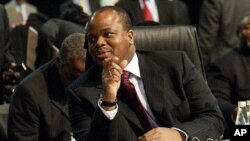The newly formed Trade Union Congress of Swaziland (TUCOSWA) has demanded the registration and participation of political parties in next year’s parliamentary election, despite strong government opposition.
“Now is the time for the country to allow political parties in terms of the elections,” said TUCOSWA president Barnes Dlamini. “There should be democratic processes in terms of electing parliamentarians and allowing political parties, first, to register and, secondly, to be given enough time to garner support from the various citizens of the country, in terms of their political ideology.”
Swaziland’s constitution bars the formation and participation of all political parties in the tiny, southern African kingdom.
The Swaziland Federation of Trade Unions (SFTU) and the Swaziland Federation of Labor (SFL) merged with the independent Swaziland National Association of Teachers (SNAT) to form what is now known as TUCOSWA.
Dlamini said his organization will soon begin a nationwide education campaign, where he said workers will enlighten Swazis in their local communities about their rights in a new democratic dispensation.
Some analysts say TUCOSWA’s demands and plans will be on a collision course with the administration, which they said frowns on partisan political activities. But, Dlamini said workers are unlikely to be intimidated by threats from the government.
“We have always been taking backlash in terms of responses from the government from time immemorial,’ said Dlamini. “In the absence of political parties, as a trade union, we will continue to bring up issues of social economic in nature. Workers are suffering under the political order in Swaziland and we are saying to government [should] sit down and address this question because time has come for it.”
Supporters of the government say TUCOSWA’s ambition is to use the power of the Swazi workers to blackmail the administration into effecting immediate democratic reforms. But, Dlamini denied the accusation.
“Our intention is not to blackmail the government, but, with time, workers have actually seen what this regime is doing and what that is doing to the citizens,” said Dlamini. “Workers are coming to the fore to say that [the] government should be structured in [such a] way that they are able to have a say in the government structures of their country.”
Dlamini said TUCOSWA will continue to resist what he calls government’s incessant manipulation of elections in Swaziland.
“Workers are more than prepared to go to the grassroots level, they are prepared to go to the communities and shed some light to show them the glaring aspect of what government should do, the glaring absence of the social standards at which a Swazi is, as I speak to them.”
Analysts say, although a constitution was reintroduced in Swaziland, the level of power invested in King Mswati III is so significant that the country can be considered an absolute monarchy.
Critics say the government has successfully stifled political opposition by putting pressure on human rights organizations, trade unions, and civil society groups and banning all political parties.




